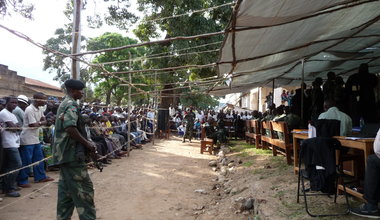Uvira, 12 June 2012 - In Uvira, a small town snaking its way between Lake Tanganyika and the towering mountains of the Great Rift Valley in South Kivu, eighteen colonels, lieutenant colonels, majors and a captain appeared before a mobile court of the DRC military justice system. Thirteen of them were found guilty of rebellion in the east of the Democratic Republic of Congo (DRC).
"This trial sent a strong signal across the country that members of the security forces – whatever their rank - must respect the law," states Scott Campbell, Director of the UN Joint Human Rights Office in the DRC. "Witnessing this trial first-hand gives hope to the population that noone - whether he is civilian or military - is above the law. It also demonstrates the increasingly positive performance of the Congolese military justice system."
For two weeks a large crowd surrounded the open-air court house to witness the trial unfold. In the heat of the day, hundreds listened expressionless to the proceedings. For the past few years, the inhabitants of Uvira have lived in fear of the men in uniform being tried before them, former commanders in South Kivu who had previously committed serious human rights violations in complete impunity, in the area and beyond in the vast Central African country.
"This is the first time we are seeing a colonel being tried" explains Stephan, from Uvira. "Through first the arrest of [Jean-Pierre] Bemba, and the conviction of [Thomas] Lubanga, the population is witnessing that when crimes or acts for violence are committed, the authors will be convicted and held accountable. The population is watching; we are angry as it is us who suffer, who are killed. We are waiting to see if the Colonels will be convicted for their actions by the Congolese justice system."
In addition to the charges filed by the state military prosecutor 14 civilians filed complaints seeking compensation , with several testifying in person about how their husbands, sons and daughters had been killed by soldiers under the command of the men sitting two meters directly behind them. They represent only a percentage of those victims of looting, rape and killings during a period of desertions within the army in the Kivus between February and April 2012.
"We came to appear before the court, in order that justice might be obtained for what happened to us," explained one of the women who had travelled far to state her case. "We are proud of the Congolese Government for holding this trial. If justice continues to be upheld, the situation in Congo will improve."
From preliminary investigations, through the legal proceedings until the transfer of the convicts to prison, several MONUSCO civilian sections worked in close collaboration with military colleagues from the UN Force to provide logistical and technical support to Congolese military and judicial authorities.
Along with other MONUSCO civilian and military components, the UN Joint Human Rights Office has been actively supporting the right to fair trials to prosecute those responsible for serious human rights violations in the DRC, including sexual violence. Human Rights Officers closely monitored the initial investigations and judicial proceedings, working with military and judicial authorities to ensure a fair trial. The Office also supported the legal representation of victims during the trial, and ensured their protection.
In the meantime, the UN Human Rights Office says more needs to be done to ensure justice for all.
"Despite the importance of this trial, much remains to be done to strengthen the Congolese justice system, ensure rule of law and end the impunity that remains widespread for members of the national army as well as armed groups," highlights Campbell. "The Congolese authorities should ensure that these officers – and other human rights offenders – are charged and held accountable for human rights abuses committed against civilians, in addition to the charges of indiscipline and rebellion for which they were convicted in this trial."
A day after the conviction in Uvira, a military tribunal convicted a further 13 people - including seven soldiers and a policeman - in a mobile court in Walungu, South Kivu for sexual violence and murder. Campbell stressed his hope to see this trend continue, holding offenders accountable and progressively dissuading would-be perpetrators.
Rachel Sherwin/MONUSCO

 UN
UN United Nations Peacekeeping
United Nations Peacekeeping



